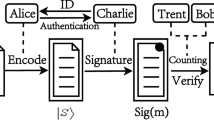Abstract
An improved quantum voting scheme based on four-qubit Cluster state is presented in this paper. This program uses quantum key distribution protocol and quantum one-time pad to guarantee its unconditional security. Furthermore, we use the entanglement of four-qubit Cluster state instead of the controlled quantum teleportation in order to reduce the technical difficulty. The significant advantage of our scheme is that transmitted information capacity is twice as much as the capacity of other schemes.


Similar content being viewed by others
References
Jan, J.K., Tai, C.C.: A secure electronic voting protocol with IC cards. J. Syst. Softw. 39(12), 93–101 (1997)
Ku, W., Wang, S.D.: A secure and practical electronic voting scheme. Comput. Commun. 22(3), 279–286 (1999)
Mosayeb, N., Gong, L.H., Monireh, N., Laleh, F.M.: An anonymous surveying protocol via Greenberger-Horne-Zeilinger states. Int. J. Theor. Phys. 55(10), 4436–4444 (2016)
Shor, P.W.: Polynomial-time algorithms for prime factorization and discrete logarithms on a quantum computer. SIAM J. Comput. 26(5), 1484–1509 (1997)
Grover, L.K.: A fast quantum mechanical algorithm for database search. Twenty-Eighth ACM Symposium on Theory of Computing. 212–219 (1996)
Tian, J.H., Zhang, J.Z., Li, Y.P.: A quantum multi-proxy blind signature scheme based on genuine four-qubit entangled state. Int. J. Theor. Phys. 55(2), 809–816 (2016)
Hillery, M.: Quantum voting and privacy ptotection: first steps. Int. Soc. Opt Eng. https://doi.org/10.1117/2.1200610.0419 (2006)
Vaccaro, J.A., Spring, J., Chefles, A.: Quantum protocols for anonymous voting and surveying. Phys. Rev. A 75(1), 012333 (2007)
Tian, J.H., Zhang, J.Z., Li, Y.P.: A voting protocol based on the controlled quantum operation teleportation. Int. J. Theor. Phys. 55(5), 2303–2310 (2016)
Cao, H.J., Ding, L.Y., Yu, Y.F., Li, P.F.: A electronic voting scheme achieved by using quantum proxy signature. Int. J. Theor. Phys. 55(9), 4081–4088 (2016)
Zhang, J.L., Xie, S.C., Zhang, J.Z.: An elaborate secure quantum voting scheme. Int. J. Theor. Phys. 56(10), 3019–3028 (2017)
Liu, X.C.: Universal three-qubit entanglement generation based on linear optical elements and quantum non-demolition detectors. Int. J. Theor. Phys. 56(2), 427–436 (2017)
Niu, X.F., Zhang, J.Z., Xie, S.C., Chen, B.Q.: A third-party e-payment protocol based on quantum multi-proxy blind signature. Int. J. Theor. Phys. 57(8), 2563–2573 (2018)
Shor, P.W., Preskill, J.: Simple proof of security of the BB84 quantum key distribution protocol. Phys. Rev. Lett. 85(2), 441–444 (2000)
Mayers, D.: Unconditional security in quantum cryptography. J. ACM 48(3), 351–406 (1998)
Lo, H.K.: A simple proof of the unconditional security in quantum key distribution. J. Phys. A 34(35), 6957–6967 (2012)
Inamon, H., Lutkenhaus, N., Mayers, D.: Unconditional security of practical quantum key distribution. Eur. Phys. J. D 41(3), 599–627 (2004)
Cao, H.J., Ding, L.Y., Jiang, X.L., Li, P.F.: A new proxy electronic voting scheme achieved by six-particle entangled states. Int. J. Theor. Phys. 57(3), 674–681 (2018)
Paraoanu, G.S., Scutaru, H.: Fidelity for multimode thermal squeezed states. Phys. Rev. A. 61(2), 180–181 (2000)
Weinstein, Y.S.: Entanglement sudden death as an indicator of fidelity in a four-qubit cluster state. Phys. Rev. A. 79(5), 1744–1747 (2009)
Acknowledgements
This work is supported by the National Natural Science Foundation of China (Grant No.61402275, 61402015, 61273311), the Natural Science Foundation of Shaanxi Province (Grant No.2015JM6263, 2016JM6069), and the Fundamental Research Funds for the Central Universities(Grant No.GK201402004).
Author information
Authors and Affiliations
Corresponding author
Rights and permissions
About this article
Cite this article
Niu, XF., Zhang, JZ., Xie, SC. et al. An Improved Quantum Voting Scheme. Int J Theor Phys 57, 3200–3206 (2018). https://doi.org/10.1007/s10773-018-3837-9
Received:
Accepted:
Published:
Issue Date:
DOI: https://doi.org/10.1007/s10773-018-3837-9




